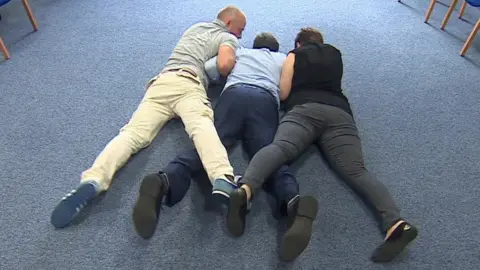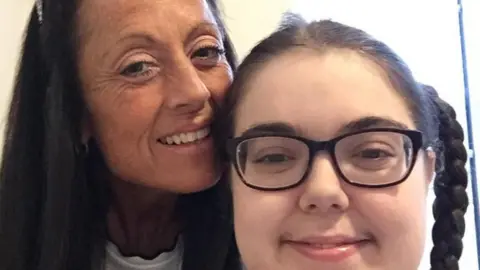'Inhuman' use of restraint on disabled patients
 BBC
BBCEvery 15 minutes, on average, a patient with learning disabilities was restrained in hospital last year, new BBC File on 4 analysis shows.
In 2019, restraint was used just over 38,000 times in England. In 2017, there were 22,000 reports of restraint.
Harriet Harman, chairwoman of the House of Commons joint select committee on human rights, said this suggested "inhuman and degrading" treatment.
The Department of Health said restraint "should only be used as a last resort".
Irregular data
The data, provided by NHS Digital and analysed by the BBC, also shows the use of prone restraint - or holding people face down - remains high, despite being against government guidelines.
Last year, it was used more than 4,000 times.
Seclusion - where people are locked in a room on their own - also remains high.
In 2019, there were 3,225 reported cases of seclusion, and 850 of those involved children.
In the first seven months of this year alone, there were more than 2,000 incidents of seclusion.
Restraint is used to manage someone's behaviour when they are deemed to be a risk to themselves or others.
NHS England says it has "driven an increase in the reporting of restraint" and "lowered the bar".
But not all hospitals and treatment units regularly provide complete data.
'Human rights abuse'
Ms Harman said the treatment "was basically a human rights abuse".
"People are not supposed to be subjected to inhuman and degrading treatment - and routine solitary confinement and physical restraint is exactly that," she said.
"We clearly don't even know the half of it, since many providers of these institutions don't give the information that they should about what's going on."
Dan Scorer, head of policy at learning disability charity Mencap, said prone restraint "should not be happening in any kind of planned way" and could result in "serious injury, and potentially death".
The figures come despite pledges to reduce restraint use, which includes seclusion, after a 2018 File on 4 programme first uncovered numbers of reported restraint had risen by 50% between 2016 and 2017.
 Family picture
Family pictureThe case of autistic 19-year-old Bethany - who File on 4 revealed had been in seclusion for 21 months - drew a personal apology from Health Secretary Matt Hancock, and prompted the Care Quality Commission (CQC) to investigate the issue of restraint.
The CQC's findings, released last month, were described as "deeply concerning" by Health Minister Helen Whately.
Bethany was kept in a room with just a foam mattress and a chair, and fed through a hatch, at St Andrew's Hospital in Northampton.
Last December, she was finally found a place in a specialist unit run by Merseycare NHS Trust.
She said: "Since I've been here, the staff have been absolutely amazing. My behaviour's settled down and my anger's settled. And I've not done any self-harming for five or six months."
She now has her own bedroom, plays the piano, goes out for walks and shopping, and is learning circus skills.
 Family picture
Family pictureDannielle Attree from Kent, who is also autistic, was in the same hospital as Bethany for 19 months, where she spent time in seclusion after first being admitted following a period of poor mental health.
Now she's in Littlebrook Hospital, run by Kent and Medway NHS and Social Care Partnership Trust, where she has been in segregation for nine months. She is sometimes locked in.
Dannielle's mum Andrea Attree told File on 4: "Dannielle doesn't know how to be able to be anywhere but in seclusion now, because it's been going on for so long.
"Her mental health has declined to the lowest I've ever seen. Her self-harm has been off the scale."
Transforming care?
The government strategy Transforming Care was launched in 2012 following the Winterbourne View scandal. It set a target to reduce the number of inpatients with learning disabilities in England by at least 35% by March 2019.
This target was then moved to March 2020. It wasn't met, and a new target has now been set to move 50% of patients by March 2024.
In 2018, there were 2,400 people with learning disabilities and autism in hospital in England. Latest figures show there are still 2,060.
Ms Harman said there was a need for a "sense of urgency", and that a special unit in the prime minister's office should be established to tackle the issue.
'Dignity and respect'
The Department for Health and Social Care said a new unit would "duplicate services".
"Our priority is always to ensure people with a learning disability and autistic people receive safe and high-quality care, and that they are treated with dignity and respect," it added.
"Government policy is that any kind of restraint should only be used as a last resort, and there is active work to reduce use of restrictive practice in mental health settings."
Figures for restraint in Northern Ireland, Wales and Scotland aren't collated. But there are more than 600 people with learning disabilities and autism in hospital in those three countries.
Kent and Medway NHS and Social Care Partnership Trust said it agreed with Dannielle and Andrea that "highly specialist services for people with autism nationally are not where we all want them to be".
It added: "Our role has been to make sure that whilst we worked with Dannielle and her mum to find the right care setting for her, Dannielle is supported, cared for and cared about in what we all agree was never set up as a long-term placement."
St Andrew's Hospital said Dannielle had made good progress while she was there, that seclusion was only ever used as a last resort, and that guidelines were followed.
It added that Bethany had been there "longer than anyone wanted", and it had worked with the NHS to transfer her to a community placement as soon as was possible.
Transforming Care? is on BBC Radio 4 on Tuesday 10 November at 20:00 BST and will be available to listen to on BBC Sounds.
